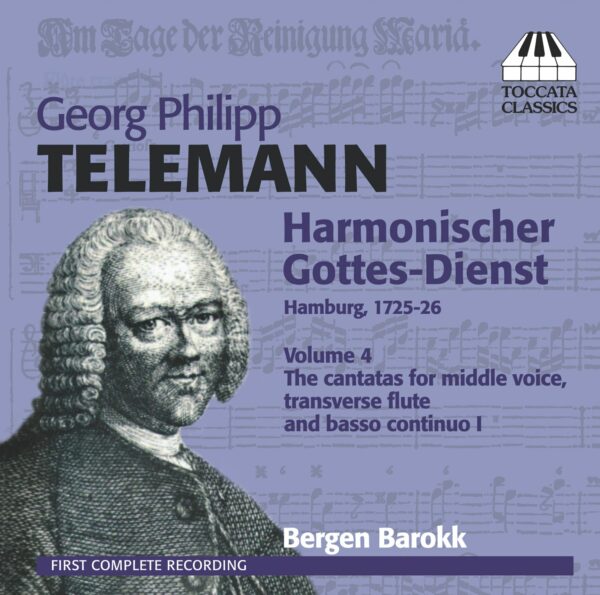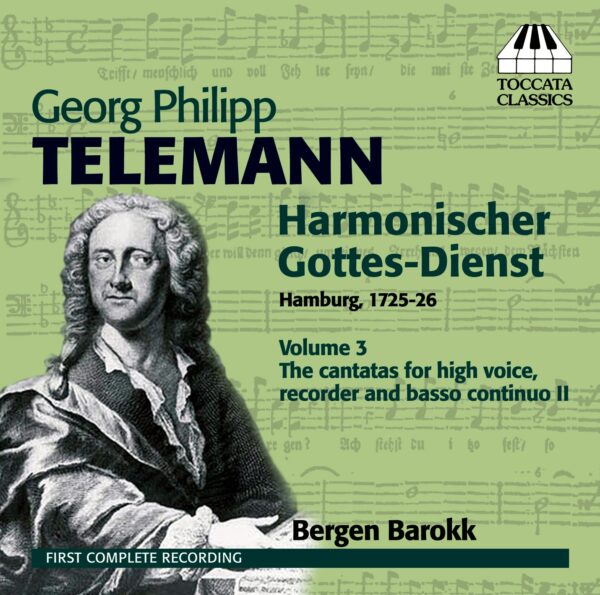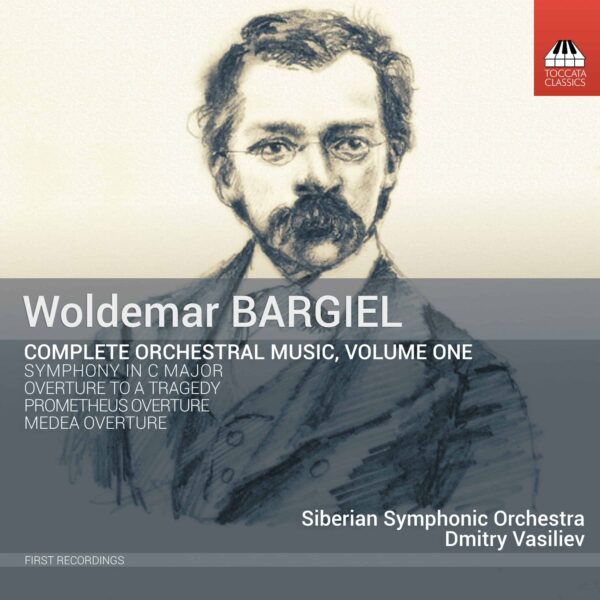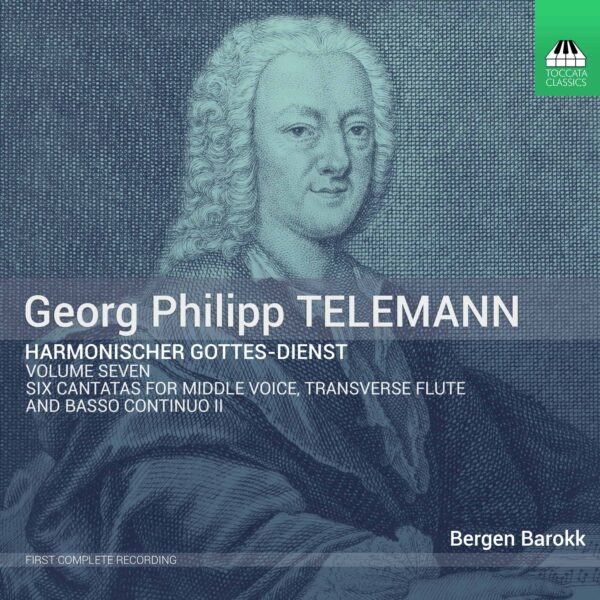Georg Philipp Telemann: Harmonischer Gottes-Dienst, Volume Four
Catalogue No: TOCC0084
EAN/UPC: 5060113440846
Release Date: 2012-02-13
Composer: Georg Philipp Telemann
Artists: Bergen Barokk
This is the fourth CD in the first complete recording of the 72 cantatas from Georg Philipp Telemann's collection Harmonischer Gottes-Dienst, published in Hamburg in 1726 — the first complete set of cantatas for the liturgical year to appear in print. The cantatas are designated for voice, an obbligato instrument (recorder, violin, transverse flute or oboe) and basso continuo, and generally take the form of two da capo arias with an intervening recitative. Although intended for worship, both public and private, Telemann's cantatas are a masterly blend of tunefulness with skilled counterpoint and vocal and instrumental virtuosity.
Bergen Barokk
Listen To This Recording:
-
Third Sunday of Advent – Vor des lichten Tages Schein (TVWV 1:1483; Bärenreiter No. 67) (1725t26)
- Aria: Vor des lichten Tages Schein
- Rezitativ: O sichrer Sünder, fürchte dich!
- Aria: Bist du selbst nicht engelrein
- Aria: Ihr Völker hört
- Rezitativ: Die Finsternis entweicht
- Aria (Vivace): Halleluja! Ich opfre deinen Strahlen
- Aria (Gratioso): Erscheine, Gott, in deinem Tempel
- Rezitativ: Der Ort, den du zum Heiligtum erlesen
- Aria (Allegro): Tod und Moder, dringt herein
- Aria (Largo): Was ist mir doch das Rühmen nütze?
- Rezitativ: Wer bist du, Mensch, und was sind deine Gaben
- Arioso: Laß dir an meiner Gnade g’nügen
- Aria (Spiritoso): Gottes Kraft erhebt die Schwachen
- Aria (Dolce ma non largo): Wandelt in der Liebe, gleich wie Christus uns geliebt!
- Rezitativ: Ein Christ muss dem allein, nach welchem wir uns Christen nennen
- Aria (Vivace): Wegre der schmeichelnden Wollust die Hände!
- Aria: Weg mit Sodoms gift’gen Früchten
- Rezitativ: Wie sollt’ich da, wo Not und Tod in Töpfen Vergnügung schöpfen
- Aria (Andante e gratioso): Gewünschtes Fest der süssen Brote
Epiphany Cantata – Ihr Völker hört (TVWV 1:921; Bärenreiter No. 3) (1725t26)
Cantata for the Feast of the Purification – Erscheine, Gott, in deinem Tempel (TVWV 1:471; Bärenreiter No. 7) (1725t26)
Sexagesima Sunday – Was ist mir doch das Rühmen nütze? (TVWV 1:1521; Bärenreiter No. 12) (1725t26)
Oculi Sunday – Wandelt in der Liebe (TVWV 1:1498; Bärenreiter No. 16) (1725t26)
First Day of Easter – Weg mit Sodoms gift´gen Früchten (TVWV 1:1534; Bärenreiter No. 21) (1725t26)





Fanfare Magazine :
‘The fourth volume of the Telemann Harmonischer Gottesdienst cycle with Bergen Baroque continues its trend in making some quite dramatic music out of works meant for smaller, less affluent churches of Lutheran Germany. This installment, the second for middle voice with countertenor Fritz Vitzthum, continues the finely nuanced and highly expressive performances of the other three volumes. Given that this is the third time I find myself including it in the Want List, I suspect that there will always be a state of intense anticipation for the next in the series ….’
—Bertil van Boer, Fanfare Magazine
Fanfare Magazine :
‘Like the other discs of this set I reviewed (especially Volume 2, cantatas for middle voice), this disc is equally inspired. The ensemble is overall excellent, with Franz Vitzhum dead on pitch and shaping each line and ornament with care and attention. The performance is dramatic and yet infused with musical taste. … Bergen Baroque has continued its march with the same extraordinary quality that brings Telemann’s music to life. This is one that will definitely be on my wish list for this year, and I for one cannot wait for the next installment.’
—Bertil van Boer, Fanfare Magazine
MusicWeb International :
‘…Telemann’s music was very popular, and that explains why, unusually, these cantatas were printed. Most cantatas of the time circulated in manuscript and directors of music exchanged liturgical compositions… As I have often written in reviews of vocal music by Telemann he was a master in translating texts into music. In these six cantatas you will find many specimens of his skills in this department.’
—Johan van Veen, MusicWeb International
the Ultimate Classical Music Guide :
‘It is an impressive series […] The solo playing is lovely. the instrumental playing is fine […] The music is charming […] {the music is} charming, pleasant, and often quite tuneful, catchily tuneful, nicely tune full, pleasing to listen to. What really got me was the text […] Here [the texts] are lovely. the poems are charming. The poems are what I think the religion should be about. […] Give volume a try’
—David Hurwitz, the Ultimate Classical Music Guide